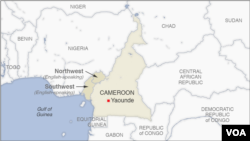There has been widespread condemnation in Cameroon of the killing and beheading of government troops and civilians, including an influential cleric, by suspected separatist fighters. Cameroonian officials say June was the bloodiest month of the year, with more than 40 people killed and 70 houses torched.
Cameroon's military says it was involved in at least 30 heavy gun battles with separatists in June. A military spokesman said Anglophone rebels massacred several dozen civilians and tried to blame the military. The statement by Army Captain Cyrille Serge Atonfack Guemo also said three troops were killed and beheaded in Bamali, an English-speaking northwestern village two weeks ago.
Atonfack said on Cameroon state radio, CRTV, that many army vehicles were destroyed but did not give details on how many troops were killed. Local media, such as Vision 4 TV and Canal 2 International, reported that at least 40 troops, separatist fighters and civilians were killed in Cameroon’s English-speaking North-West and South-West Regions in June.
Deben Tchoffo, governor of Cameroon's North-West Region, says several civilians including a Muslim cleric were accused of collaborating with the military and beheaded. Tchoffo says many civilians were killed by homemade bombs that are increasingly used by separatist fighters.
He says he has ordered the military to adopt different strategies to respond to new forms of separatist attacks, such as the use of improvised bombs that cause huge casualties among civilians and government troops. He says the military has been deployed to stop fighters. He says village chiefs, the clergy and militias created by civilians should assist the military by sharing information on possible separatist hideouts.
Tchoffo says it will be difficult for the military to restore peace if civilians refuse to collaborate with the military for fear of being targeted by separatist fighters.
Capo Daniel is a self-proclaimed deputy defense chief of the Ambazonia Defense Forces, a rebel group in Cameroon’s western regions. He says fighters have reviewed their strategy and are increasingly planting bombs on roads used by the military.
"It has been close to a year now since the Cameroon military introduced armored personnel carriers and armored vehicles, so our forces [separatist fighters] on the ground have adapted and they are now using improvised explosive devices to target those armored personnel carriers and armored vehicles. We have used those weapons in Kumbo in Melim, in Jakiri, in Nkar, Takijah area there and going towards Ndu. We are in the middle of a war," he said.
Cameroon’s military said it detonated 30 IEDs planted by fighters in 14 northwestern towns and villages including Melim, Jakiri and Nkar.
Civilians said the military torched houses in villages and towns where bombs were planted, accusing civilians of collaborating with fighters by not reporting them.
The military said it remained professional and accused separatist fighters of what it called atrocities.
Cameroonian NGOs, churches and political parties including the opposition Social Democratic Front and the ruling Cameroon People’s Democratic Movement have condemned the killing and beheading. The SDF described June as the bloodiest month this year in Cameroon.
Fabrice Lena is secretary general of the Popular Action Party and coordinator of the NGO African Peoples Foundation, which protects civilians in conflict. He blames both the military and separatist fighters for abuses on civilians.
"Violence in all its forms is unacceptable. Beheading is gross human rights violation, and we have to understand that whatever thing that people do, they are going to face the law, face justice because we are very sure that we [Cameroonians] are going to set up a truth, justice and reconciliation commission that will investigate into the crimes that have been committed by whosoever. So we condemn all sorts of killing, violence, beheading and burning of houses by separatist or the military. It is unacceptable," Lena said.
Violence erupted in 2017 in Cameroon’s English-speaking regions when teachers and lawyers protested alleged discrimination at the hands of the French-speaking majority.
The United Nations says 3,000 people have been killed and more than 750,000 displaced in Cameroon’s French-speaking towns and in neighboring Nigeria.
The Norwegian Refugee Council reports that Cameroon tops its annual list of the world’s most neglected displacement crises.




